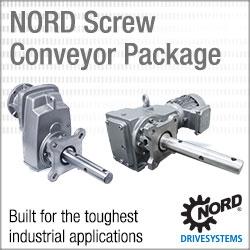A conversation with Steve Huntley of Enlightened Crops on how he discovered Freight Farms and leveraged previous business experience into his new venture of Container Farmng
 Launching a Successful Second Career with Container Farming
Launching a Successful Second Career with Container Farming

Case Study from | Freight Farms
Steve wasn’t always a farmer. After some years in the corporate world, he started a small service business with his wife Cathy. The business focused on plumbing, heating, and cooling, and the couple ran it successfully for 18 years. In 2017, Steve and Cathy decided that they were interested in moving on to something that would be more flexible as they looked towards retirement.
They set out looking for a new venture that would benefit the community–especially in the downtown area. One thing they found was a lack of fresh produce availability in Downtown; They decided to explore that route and ran into the concept of hydroponic farming.
A friendly face
Steve wasn’t the only person in Grand Rapids interested in hydroponics. Brian Harris had previously purchased a Leafy Green Machine (LGM) and was a long-time friend of Steve’s from a job 30 years ago! Steve had been thinking of pursuing hydroponics with a free-standing warehouse system, but after seeing Brian on local TV, he reached out and saw the LGM for himself. After working at the farm with Brian a few times, Steve was convinced this is was what he was looking for.
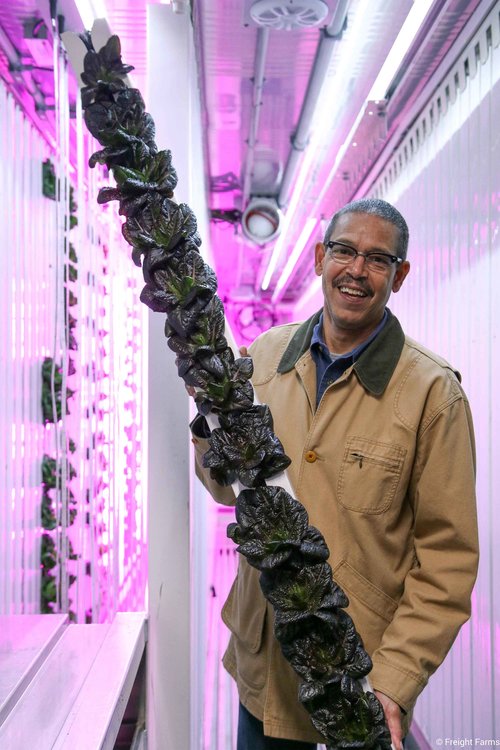
Fellow Freight Farms Brian Harris of Green Collar Farms
“We were very impressed with the Freight Farm, how efficient everything was–it was already pre-set up and there was great support. We did some calculations and, with good yields, we could supply a lot of product to the urban area.”
— Steve Huntley
No experience, no problem
Steve felt comfortable pursuing a new farming career in spite of having almost no agricultural background. While he had grown up in a farming community, the closest Steve had gotten to commercial food production was a small personal garden at home. However, he was sure that with the farm’s smart set up, and the support of Brian, fellow farmers, and the Freight Farms team, he could be successful.
THE BUSINESS
Previous business experience helped Steve think strategically about his market.
“First thing you want to find out is if the market’s available: It could be a great idea, but if the market’s not ready or saturated, it won’t work.”
With this in mind, Steve created a market research form with questions for chefs and sous chefs, their initial target customers. The goal was to get a sense of the market, and they came away with a resounding yes, especially for access to good quality produce year-round in Michigan’s seasonal climate.
Knowing that the demand was there, Steve and Cathy looked at their potential yields, calculated potential expenses and profits, and decided they were ready to start farming.
Taking a leap of faith
Before the arrival of his farm, Steve had marketed the produce to chefs that were excited about the idea of local, chemical-free produce. However, without samples, he wasn’t able to finalize any agreements. At that point, he had to trust that his due diligence had been enough.
“The leap of faith is necessary for anyone starting any business. You can get all the data, but nothing is guaranteed. You have to just make an educated guess...If you’re passionate about it...it will work out for you.”
— Steve Huntley
Friends > competitors
In spite of the fact that Steve and Brian are both Freight Farmers in the same city, Steve doesn’t believe they’re anywhere near saturating the market and becoming direct competitors. Steve explains: “The Freight Farm is such a unique concept that there’s enough to go around in our area. We do experience competition from other types of–mainly larger–hydroponic farms, but we’re carving out our niche.”
Finding customers
Since launching his farm, Steve’s customers include several high end restaurants, an urban fresh food grocery store, and–most recently–a fresh food distribution company that delivers Steve’s greens to stores around the city.
Steve initially focused on restaurants because they had smaller demands that would be more achievable while him and Cathy were getting comfortable in the farm. He approached several high end restaurants (the ones that would want to pay a premium for greens) with samples from his newly-arrived farm and some informative brochures.
These he either mailed or, more successfully, dropped off in person during off-peak restaurant hours. Once Steve’s farm was producing higher yields, he approached retail stores in his area with the same tactic.
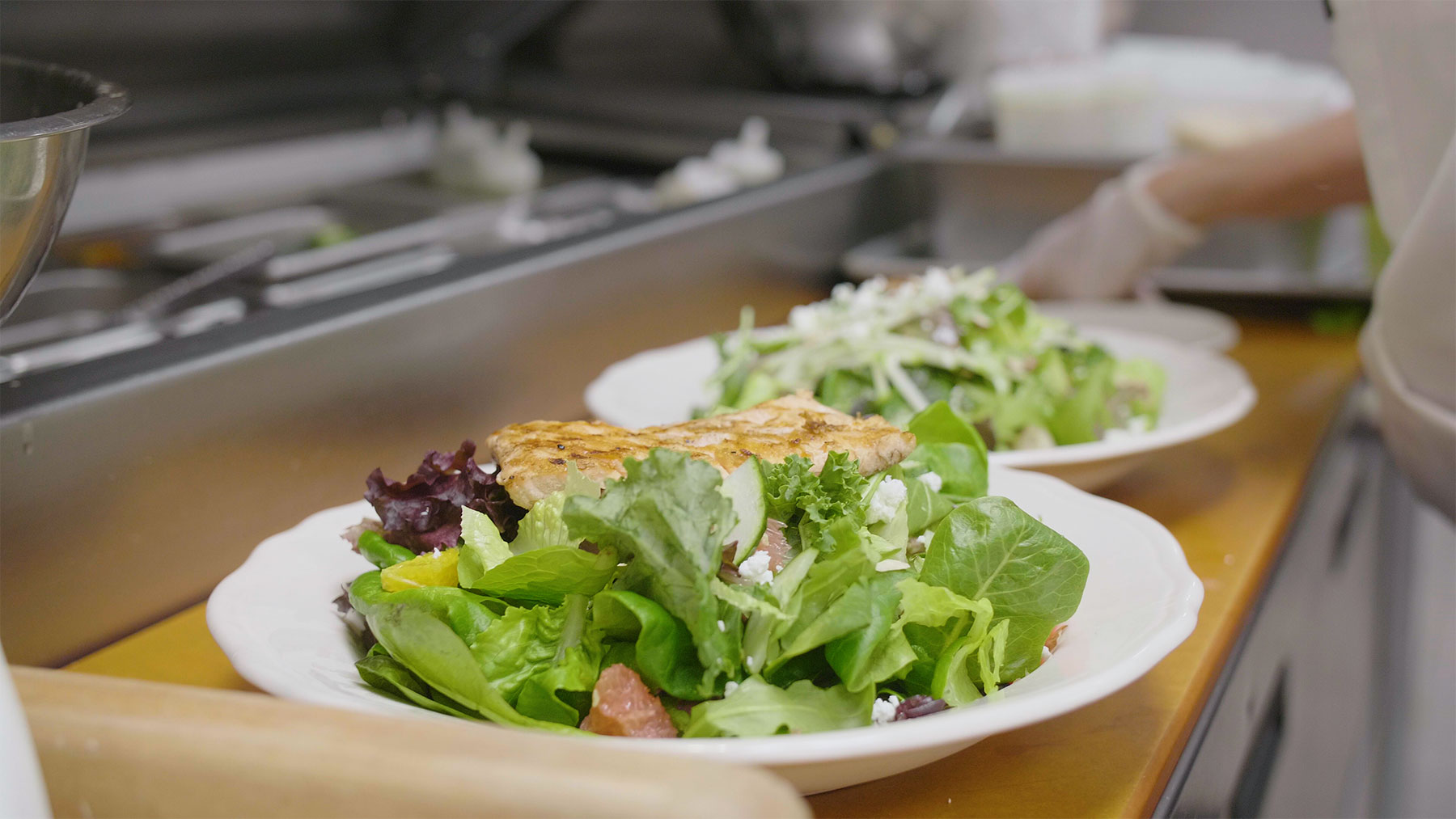
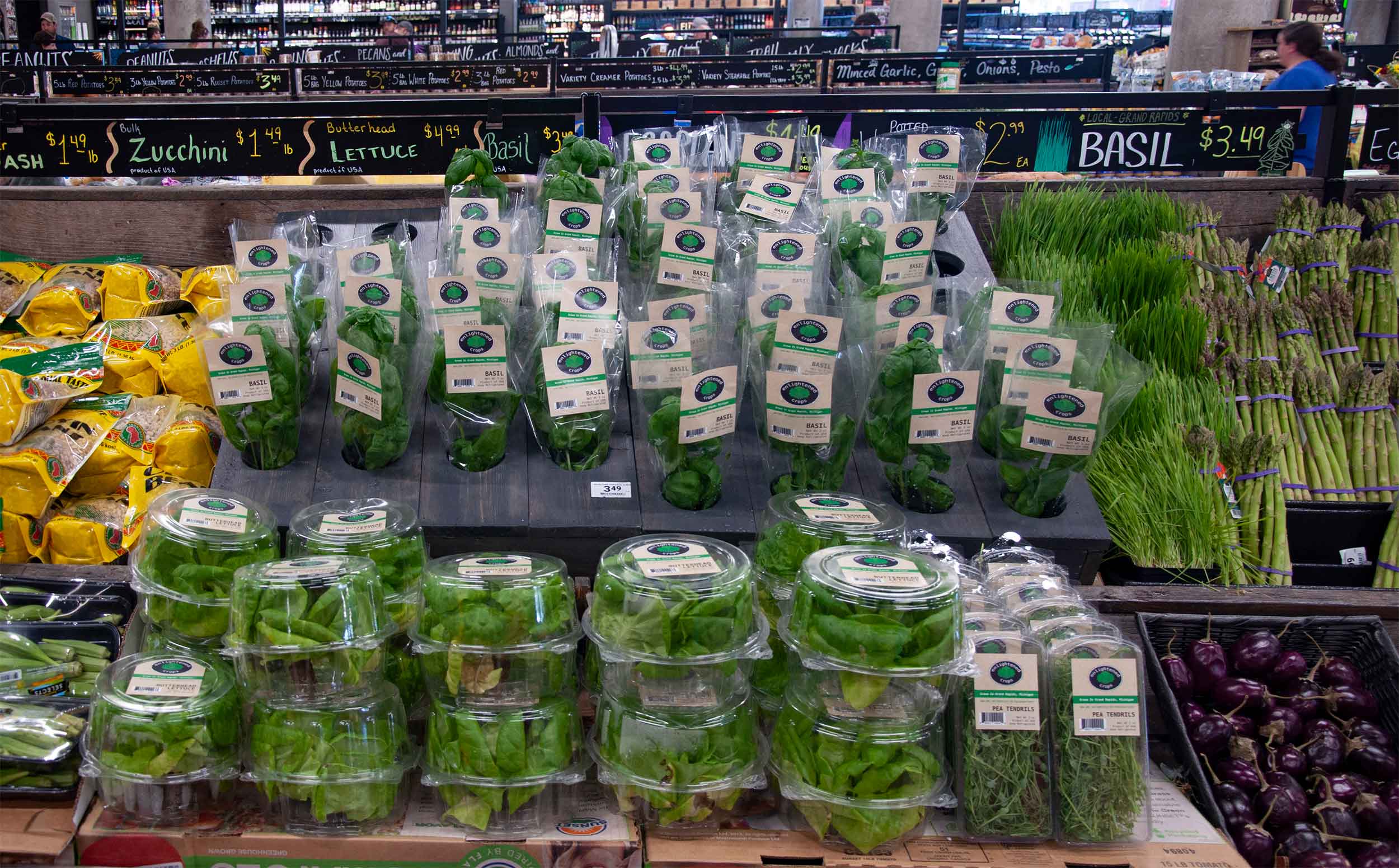
— Steve Huntley
Steve also runs a small farm stand for friends and neighbors. Since he frequently schedules more production than he needs to make sure regular customers always get their demands met, this means that there are usually crops left over. Steve sells surplus produce through a simple online portal (using Eat from Farms) that customers can use to order whatever Steve has in stock. He also uses surpluses as an opportunity to donate to local food banks.
Crops and yields
So what is Steve actually selling to this wonderfully diverse customer base?
After lots of feedback and testing, Steve has narrowed his production down to a few superstar crops: Arugula and basil form 80 percent of the farm’s production, while artisanal lettuces make up the remainder of the farm’s weekly output. Steve differentiates his produce for his different customers: the grocery store sells a selection of everything he grows, while the restaurants mainly purchase arugula and lettuce.
When it comes to yields, Steve is always looking to optimize. Currently he grows 8-10 ounces of basil and 16 ounces of arugula per tower.
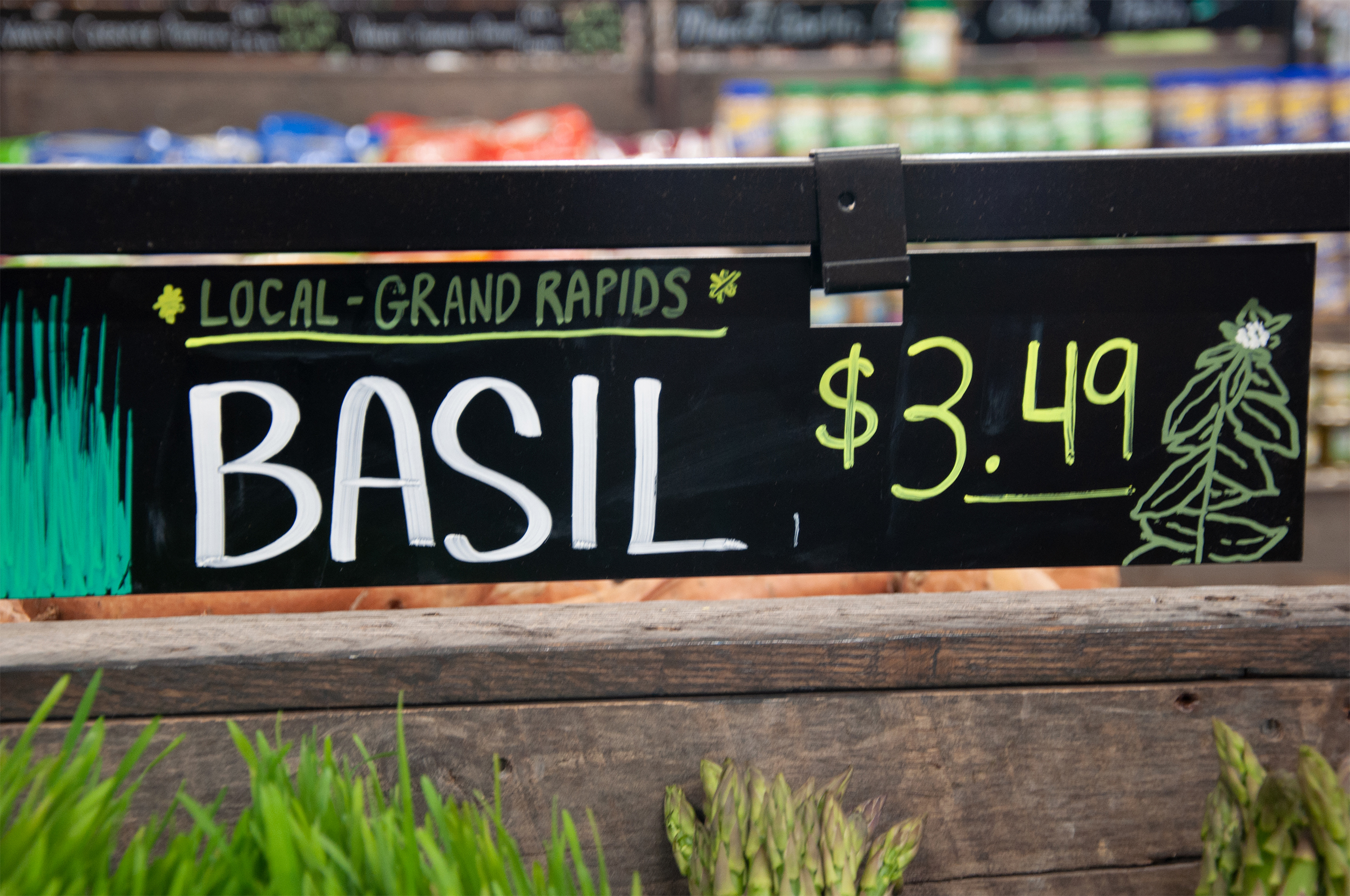
Determining Price
Steve begins his price negotiations by calculating all of his expenses–seeds, electricity, etc–to get a sense of the overall and unit costs of the farm. This helps him go into meetings with a good idea of what price he needs to make a profit. After a few rounds of negotiating, Steve and his buyer are able to land on a price that works for everyone.
Thanks to the quality of his produce, Steve is able to negotiate a premium price for his crops. Steve also gets higher prices by promising his customers that he will keep the price consistent.
“[Customers] like the fact that they can budget, they don’t have to worry about prices going up and down; We can give them a price that is consistent all year long.”
Marketing
Steve relies on the popularity of local food as a way to differentiate himself at the store, saying “Local is huge” for consumers, who increasingly want locally-sourced food that is fresher, cleaner, and more transparently-grown.
Demos are one of Steve’s greatest marketing strategies: every time they’re able to give people a taste they see their sales go up. When people ask if the produce is organic, Steve doesn’t skip a beat. He tells them: “We’re not certified organic, but we don’t have any contaminants in our soil because we don’t use soil, there are no toxins from the air or the rain…We’re better than organic.”
SITE & OPERATIONS
Convenient Location
The Enlightened Crops farm is located on the west side of Downtown Grand Rapids, Michigan in a parking lot near the expressway. The site is very convenient–it’s kiddy-cornered with the grocery store Steve sells to, and is just a few minutes driving distance away from the restaurant customers.
Steve shares the site with Brian–in fact, Brian already had the site set up by the time Steve was ready to buy. All Steve had to do when his farm arrived was set up an electrical connection. Since there’s no running water, Steve uses a water reservoir tank and is able to pump water directly into the farm.
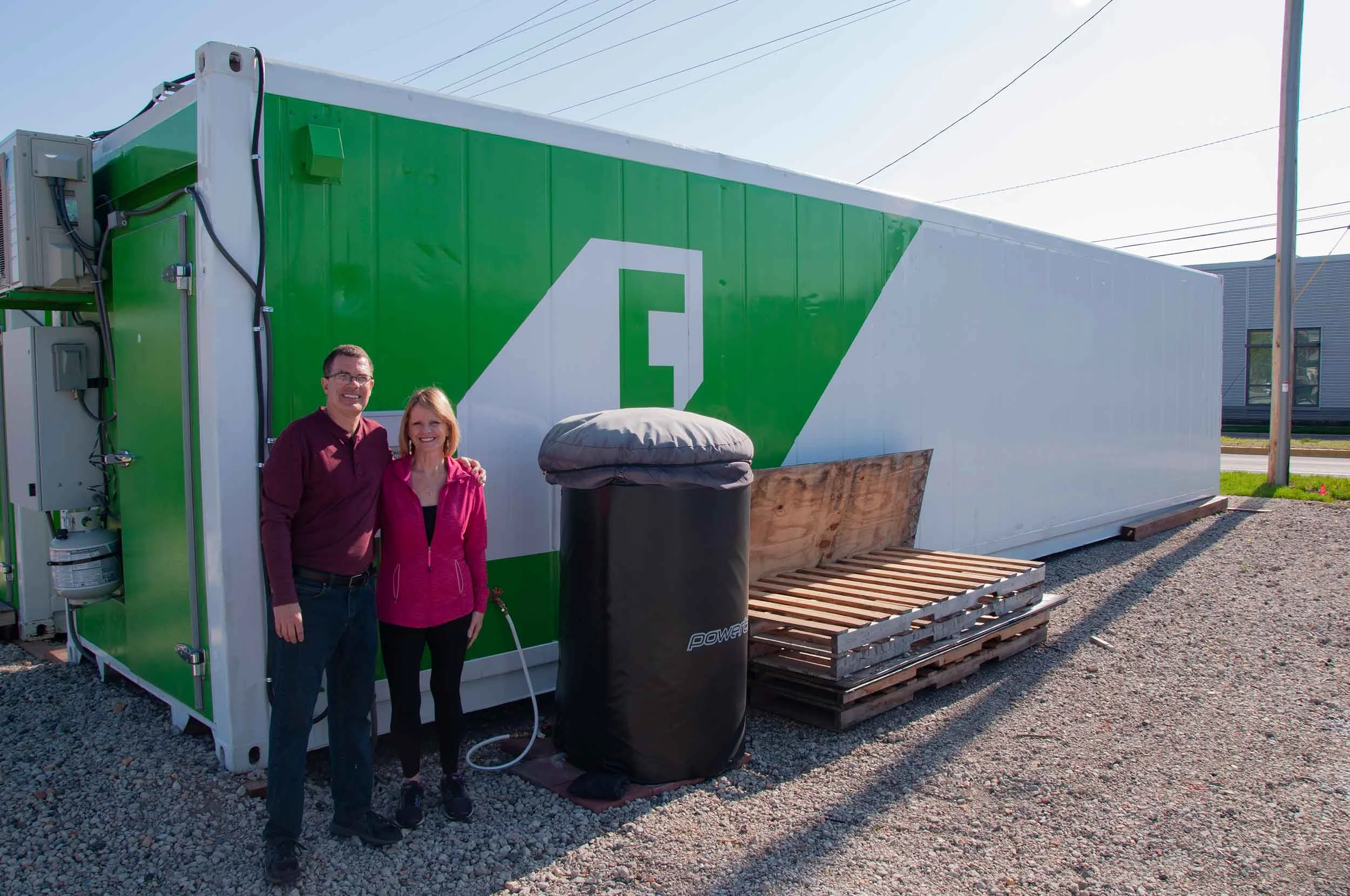
Ramping Up
The Leafy Green Machine was delivered mostly pre-assembled, so the first few days were spent on the finishing touches: hanging towers, calibrating sensors, and connecting pumps. Steve was able to rely on his new neighbor, Brian, and the Freight Farms team for support througout.
Even with the support, the first few months had their challenges. Steve and Cathy had trouble finding the right watering and harvesting schedules, which led them to over-water the plants and leave them in their towers for too long. However, by tracking their operations carefully they were able to learn from their mistake. Steve advises new farmers to do the same: “Use analytics as much as you can to track how long you have certain towers in, what plants in what towers, and what area of the farm...It all helped us to go back and look at that data as we were learning those first six months.”
Day-to-day Operations
Most days, it’s just Steve and Cathy working in the farm, with occasional help from their son. Together they’re able to share the farm work, which on top of seeding, transplants, harvesting, and cleaning also includes keeping careful track of their plants, all the way from the seeds’ log numbers, to the final destination. This not only helps the Huntleys track their yields, but is important in staying transparent with their customers.
Steve and Cathy spend a combined 20 hours working on their business. This involves a general 70-30 split of time spent in the farm compared to meetings or marketing activities; These proportions can change when Steve is actively working on winning new business.
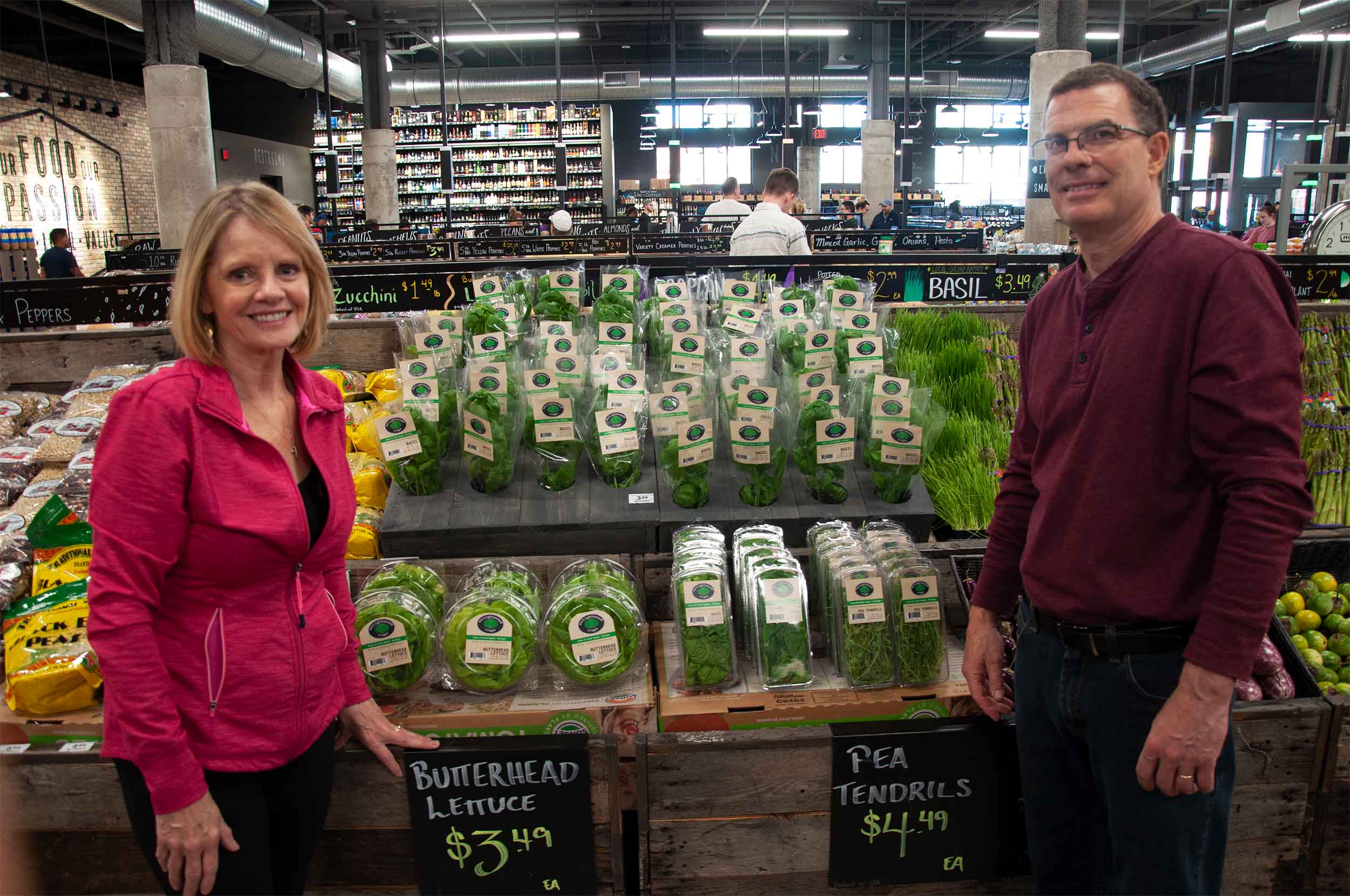
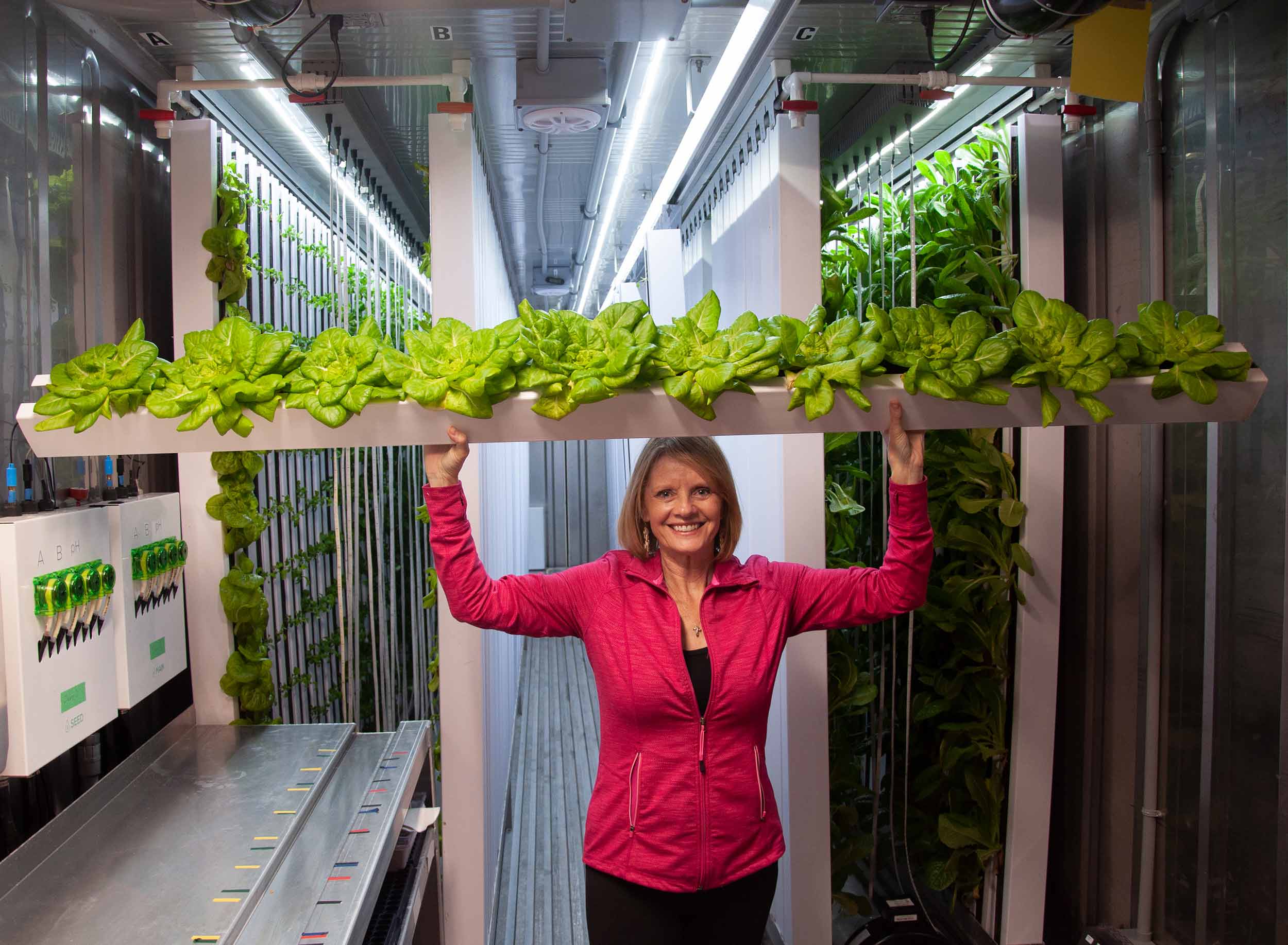
Packaging
Steve’s customers have varied packaging requirements. Restaurants simply ask for the crops to be delivered in 1-2 lb bags. Retail outlets require much more specific packaging, including food-safe clamshells, UPC codes, barcodes, and printed labels with product specifications. This sounds complicated, but Steve encourages new farmers not to be intimidated: “There’s a lot more work getting started with a retail chain, but once it’s up and going, it’s really not that bad at all.”
As with other parts of the business, Steve is constantly looking ahead at ways to make his product better. With packaging, this means moving away from plastic as much as possible. To that end, Steve is working with the University of Michigan to develop plant-based clamshells, as well as with the store itself to find ways to display and sell the produce in a way that doesn’t require any plastic.
Delivery
Delivery is simple for Steve since all his customers are located nearby. He delivers to the grocery store three times a week, usually by walking the produce across the street, and then makes one-time weekly deliveries to his restaurant customers. Individuals purchasing online will come to the farm or to Steve’s house to grab their orders.
COMMUNITY
Many of the people in Steve’s life where justifiably surprised when he announced he was starting a farming business. However, once they learned more about the technology, the surprise turned into excitement.
The community reaction
“The more educated people get, the more interested they become in our kind of farming: local, no chemicals, and fresh.”
The customers’ reactions
“[My customers] are drawn to the taste and the smell–they take a bite and they love how fresh it is, the appearance of it is beautiful and green.”
LIFESTYLE
Not only does Enlightened Crops create a benefit for the community, but it has also had a positive impact in Steve’s life. Steve exalts, “For most of my life, I was working the 8-5, if I was lucky! The farm gives us a lot of flexibility which, as we slide into retirement age, was very important to us. I love working down at the farm–it’s quite and relaxing, not physically demanding, plus we can plan our day!”
The content & opinions in this article are the author’s and do not necessarily represent the views of AgriTechTomorrow
Comments (0)
This post does not have any comments. Be the first to leave a comment below.
Featured Product
